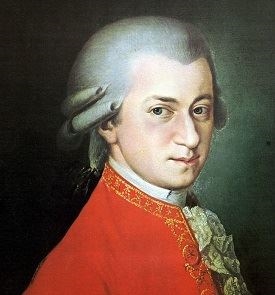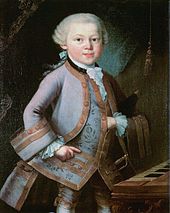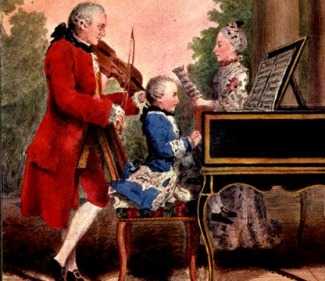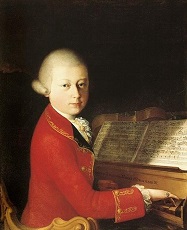 |
| Wolfgang Amadeus Mozart (http://kidsmusiccorner.co.uk/composers/classical/m (Barbara Krraft )) |
"'I pay no attention whatever to anybody's praise or blame. I simply follow my own feelings'" (Wolfgang Amadeus Mozart). Wolfgang Amadeus Mozart was born on January 27, 1756 in Salzburg, Austria, and died on December 5th 1791, in Vienna Austria. Throughout his short life, he would compose over 600 pieces, including concertos, quartets, operas, and symphonies. He would become one of the most profound composers of the 18th century. Yet, when people think of a hero, most imagine a character who saves others, like a firefighter, or a soldier carrying a wounded comrade through a battlefield, a doctor discovering a new cure, or a selfless being such as Mother Teresa. Definitely not some eighteenth century composer, not an artist from the obscure past, who had never saved anyone, nor one who shone brightly as a pillar of society. No, not Mozart. So, of all people, why Mozart? It was because of his determination, perseverance, and musical ingenuity, that would make him the hero that we know today.
 |
| Wolfgang Amadeus Mozart as a Child (https://en.wikipedia.org/wiki/Wolfgang_Amadeus_Moz (Anonymous )) |
Mozart, despite that many doubted him and did not agree with his airy, quick, and light style of music, was determined to keep composing; "He composed works in most of the major operatic genres of his day--including opera seria, opera buffa, and Singspiel" (International Dictionary of Opera). Yet having composed these works, he was shunned by higher society and his own father was disappointed with him. In a letter addressed to his parents, Mozart admits; "'I cannot write in verse, for I am no poet. I cannot arrange parts of speech with such art as to produce effects of light and shade, for I am no painter. Even by signs and gestures I cannot express my thoughts and feelings, for I am no dancer. But I can do so by means of sounds, for I am a musician..I beg you most humbly to go on loving me just a little....until I get new drawers made in my small and narrow brain-box, into which I can put that wisdom which I intend yet to acquire'" (Nardo 60). Yet, in spite of the lack of support from his father, Mozart did not stop composing and further developed his own style; " Mozart demonstrated remarkable mastery of the styles and conventions popular at the time, but he regularly pushed the conventions to fit with new ideas of his own" (International Dictionary of Opera). However, these 'new ideas' were not always taken gladly by his audience; "One of his greatest works, it [the opera, The Abduction from the Seraglio] opened in July 1782 and enjoyed much popularity with the public. However, after seeing the opera, Joseph II, now Holy Roman Emperor and the man whom Mozart most wanted to impress, reacted with the inane statement, 'Too many notes, my dear Mozart'" (Nardo 13-14). Despite harsh criticism from people of power and court musicians of his time, Mozart was determined to pursue his own style of music and did not surrender to make music with fewer notes; "He could have written the kind of music they [upper-class societies] wanted and enjoyed success. But for him music was more than a profession and a passion. It was a cause to fight for. To take an artistic stand and also to show his contempt for those who had rejected him, he refused to change his composing style, regardless or the consequences" (Nardo 76).
 |
| Mozart With His Father and Sister in Paris, 1763 (http://amadeusmozart.weebly.com/family-life.html ()) |
In addition to the lack of understanding of his music by those in power, Mozart would have to persevere in his musical feelings while struggling in health. Since childhood, Mozart was frequently ill and prone to disease. Very often, his condition would worsen while working on a certain piece. For example, while writing his opera, The Magic Flute, he began to feel sicker and sicker as he composed. Sometimes, he was so weak, that he would be unable to stand and conduct. During the first performance of The Magic Flute, his assistant, Franz Sussmayer had to turn the pages of the music score for him. (Nardo) It didn't help that Mozart was having trouble with his finances. After his death, his wife was so poor that he would be buried in an unmarked pauper's grave. Mozart was not a good money manager, and all his life had to borrow from family and friends. Many times, he tried to find a suitable musical position as a court composer, but was never able to obtain one. As a result, he had to earn a living by giving music lessons, "which he considered a boring waste of time" (Nardo 12). These rejections, however, did not mar his music. In his final year, Mozart eventually fell so ill that he was confined to bedrest; "In spite of his pitiful physical condition, Mozart insisted on completing the Requiem. When he became too exhausted to write, or when his fingers were too swollen to hold a pen, he dictated the musical notes to his pupil." (Nardo 29). Even while on his deathbed, Mozart heroically persevered in composing his last and final piece, the Requiem. Today, a listener of Mozart's graceful and joyful Concerto No. 3 in G Major would never guess that its creator died destitute and was buried in a pauper's grave.
 |
| Mozart Playing Sonata k. 27a (https://mozartschildren.wordpress.com/2013/01/27/h (Saverio dalla Rosa)) |
Mozart did not abandon his musical ideas despite criticism of his music such as "overloaded, overstuffed, difficult to listen to, fit only for connoisseurs," and lacking "taste and feeling" (Siepmann 154-155). In his ingenuity, Mozart expanded the orchestra in his operas so that they sounded like symphonies. Like nobody before him, he used dissonant and chromatic harmonies, and was the first composer to bring forth Shakespearean mixtures of tragedy and comedy into musical theater. Mozart, like a true hero, prevailed in his vision of music. Like a true hero, he made a choice of standing against of what was common and familiar and opened a door to a new era of music; "The increased use of dissonant chromaticism added rich new colors to music's expressive palette, both tonal and psychological and anticipated the dominance of inner turbulence...mingling of tragedy and comedy deepened the dramatic and psychological power of ambiguity and its potential for suspense. In this, Mozart's music...was both revolutionary and prophetic" (Siepmann 153).
Wolfgang Amadeus Mozart. A man perceived as a misfit by many of his time. Sickly, penniless, and different. Yet, a deserving hero. Like a true hero, Mozart inspired others with his determination, perseverance, and ingenuity of music. Like many heroes, Mozart was determined. Like many heroes, Mozart had to overcome countless obstacles, health, lack of money. Like many heroes, he did not give up and persevered against the odds. Like many heroes, Mozart started something new through the novelty of his music. Moreover, like a true hero, Mozart's legacy extends beyond his music. His works have "shown to aid concentration, improve the memory, stimulate thought, enhance imagination, and alleviate depression and anxiety, in countless students, writers, artists, and workers, many of whom may never have heard his music before" (Siepmann 161). Through his music, Wolfgang Amadeus Mozart became an immortal hero, one who will be remembered for an eternity.
Page created on 3/25/2017 1:13:41 PM
Last edited 3/25/2017 1:13:41 PM
